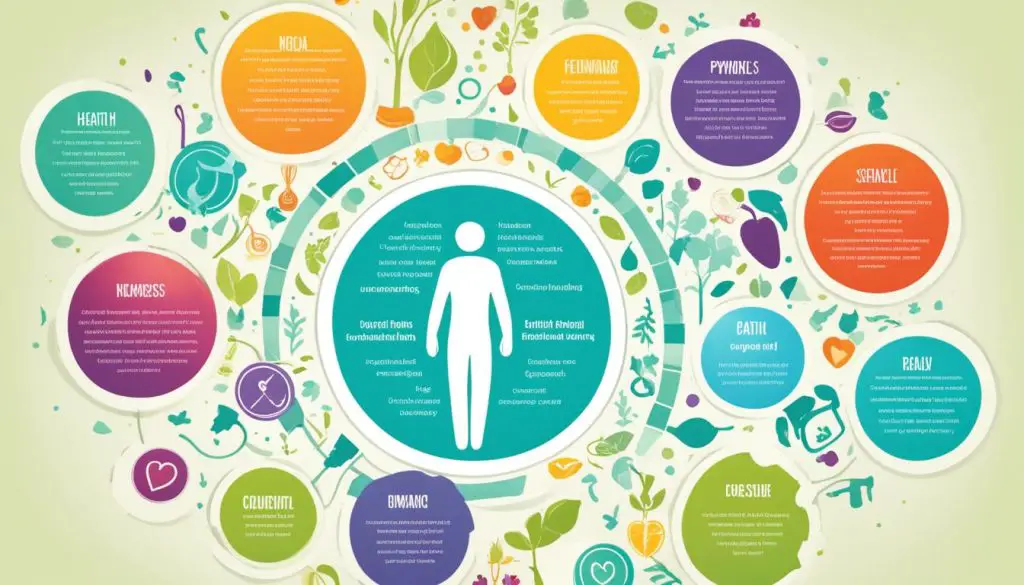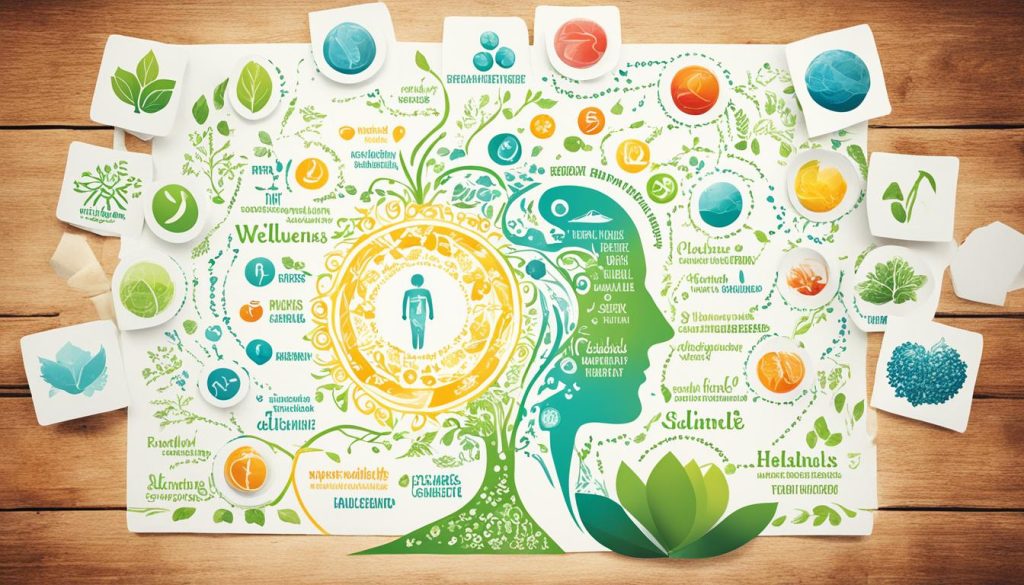
To truly summarize how the components of health are related to wellness, it’s crucial to understand that well-being is much more than the absence of illness. Interweaving well-being links throughout the various facets of life, the health components and wellness connection present a dynamic framework underpinning a contented and fulfilling existence.
Essential to this is the health and wellness integration, a harmonious blending of physical, emotional, intellectual, and other wellness aspects, each playing a synergistic role in nurturing the whole person.
The Multidimensional Facets of Health and Their Wellness Correlation
To achieve holistic health connection requires an understanding of the complex interplay between various health components and how they contribute to wellness correlation.
Comprehensively nurturing our well-being is about much more than occasional medical check-ups or sporadic bouts of exercise;
it’s about a continuous commitment to fostering physical and mental health synergy. Let’s check the relationship between key health components and their significance in the puzzle of wellness.
Physical Health: Building a Resilient Foundation
At the core of wellness relationships lies physical health, a crucial player in life’s wellness dance. Advocating for medical factors such as routine exercise and balanced diets, we set up a domino effect that enhances other health aspects.
The importance of health components in wellness starts with a body capable of achieving daily tasks without undue fatigue or physical stress, laying the groundwork for an emotionally and intellectually vibrant life.
Emotional Wellness: The Heart of Holistic Health
Not to be overshadowed, emotional resilience is the very heartbeat of our overall health.
The ability to navigate our emotions, to emerge from adversity with a sense of hope, inherently ties to our wellness.
Positive relationships and effective stress management are not just niceties but vital factors linking health components to wellness on a grander scale. A wholesome emotional sphere supports the mental and physical stamina needed to thrive.
Intellectual Vigor: Fueling the Mind for Growth
Lifelong learning is not just a buzzword; it’s a pillar of intellectual stimulation, a gateway to never-ending growth, and a key player in a well-rounded health approach. The consistent pursuit of knowledge, creative expression, and the cultivation of our skill set empowers us with a resilient and agile mind, capable of contributing to our health in unexpected, profound ways.
| Health Component | Definition | Benefits | Key Practices |
|---|---|---|---|
| Physical Health | The functionality of the body and absence of disease | Enhanced energy, improved mood, reduced stress | Regular exercise, balanced diet, adequate sleep |
| Emotional Wellness | The ability to understand and manage emotions | Greater resilience, positive relationships, overall happiness | Mindfulness, communication, stress management techniques |
| Intellectual Vigor | Mental engagement and lifelong learning | Increased cognitive function, creativity, problem-solving ability | Reading, exploring new hobbies, academic courses |
In summary, the holistic health connection we forge by blending these elements of well-being forms a comprehensive tapestry.
Each aspect, be it physical strength, emotional maturity, or intellectual curiosity, coalesces to sculpt a richer, more fulfilled human experience. Understanding and honoring the wellness relationships among these components is quintessential in architecting a life of wellness and vibrancy.
Summarize How the Components of Health are related to Wellness

The journey to achieving overall wellness relies on a delicate balance and holistic view on health components. Each aspect of wellness, be it physical, intellectual, emotional, or social, interlinks with others to create a harmonious life experience. This intricate relationship between health components and overall wellness is a continuous dance—where the quality of one step influences the next, and ultimately, dictates the gracefulness of our holistic health performance.
To truly grasp this connection, it is essential to visualize wellness as a mosaic, with each health component representing a distinct piece of the larger picture. Let’s consider a table that outlines the primary health components, their individual roles, and how they collectively contribute to our holistic well-being.
| Health Component | Individual Role | Contribution to Overall Wellness |
|---|---|---|
| Physical | Maintenance and enhancement of the body’s capabilities and functioning. | Serves as the foundation for the energy and ability to engage in other wellness areas. |
| Intellectual | Stimulation and growth of knowledge and creativity. | Promotes mental flexibility and problem-solving abilities, affecting daily decision-making. |
| Emotional | Understanding, expressing, and managing feelings. | Facilitates resilience, empathy, and the cultivation of positive relationships. |
| Social | Development and maintenance of meaningful relationships. | Encourages community connection, belonging, and social support systems. |
| Spiritual | Cultivation of purpose and alignment with personal values. | Offers a sense of meaning and context within the broader spectrum of life. |
Self-regulation and habits also hold significant sway in reinforcing this web of wellness. Consistently making choices that honor our bodily, intellectual, and emotional needs while maintaining nurturing social connections, develops our ability to live strategically aligned with our deepest values.
Understanding these components not only allows us to create individual strategies for improvement but also reiterates the importance of interconnectivity—how one facet’s health can ripple into others, making the holistic approach not just desirable, but imperative for a vibrant and sustainable wellness journey.
Integrating Health Components for a Synergistic Approach to Wellness
The quest for wellness extends far beyond the confines of mere physical health; it is an intricate dance of multiple components that must harmonize for a truly holistic sense of wellness. To achieve a state of complete well-being, one must explore and integrate the strands of spiritual, social, and practical aspects of health. Let’s delve into how these pieces fit together to create a larger picture of health and wellness.
Spiritual Well-Being: Connecting to a Deeper Purpose
In the pursuit of spiritual fulfillment, individuals may seek to connect with something larger than themselves, which serves as a compass for their life’s direction. Whether through meditation, community service, or other personal practices, spiritual well-being is rooted in a sense of purpose and contributes to overall wellness. Living according to one’s values and aspirations is not only fulfilling but also empowers one to surmount life’s hurdles with resilience and perspective.
Social Health: Creating a Supportive Network
Social wellness is paramount in this interconnected web of health components. Positive social connections foster emotional support, reducing stress and enhancing one’s social wellness. Through active engagement in community life, empathetic relationships, and healthy boundary-setting, social health strengthens the individual, thereby fortifying the broader structure of holistic well-being.
Environmental and Vocational Wellness: Undeniable Links to Overall Health
Last but certainly not least are the environmental and vocational aspects of health. A clean and serene environment contributes significantly to environmental wellness, promoting comfort and tranquility in one’s daily surroundings. On the career front, vocational health is reflected in the satisfaction and enrichment derived from meaningful engagement in work that resonates with personal values. Both elements are quintessential for a proactive and preventive approach to health, culminating in a fulfilling life enriched by copacetic personal contributions to society and the planet.
FAQ
Q: How are the components of health related to wellness?
A: The components of health are intricately related to wellness by forming a multi-dimensional approach that includes physical, emotional, intellectual, social and spiritual well-being. Each of these components plays a vital role in an individual’s overall health, and they are all interdependent, working together to create a holistic sense of wellness. Just as a deficit in one area can lead to imbalances in others, improvements in one component can enhance the state of others, thus contributing to overall well-being.
Q: What role does physical health play in relation to wellness?
A: Physical health serves as a foundational element of wellness, emphasizing the importance of maintaining a strong and functional body through regular exercise, proper nutrition, and adequate rest. Caring for the physical self helps to enable better performance in daily activities, enhances mental health, and facilitates the prevention of diseases, thereby having a direct and positive impact on holistic wellness.
Q: How does emotional wellness contribute to overall health?
A: Emotional wellness is a critical component of health that involves understanding, expressing, and managing feelings, as well as developing resilience and building satisfying relationships. It is integral to overall health because it affects decision-making, behavior, and the ability to cope with stress, all of which have significant implications for one’s physical and mental well-being.
Q: Can intellectual activities impact one’s wellness?
A: Yes, intellectual activities significantly impact wellness by fostering mental sharpness, creativity, and problem-solving skills. Lifelong learning, curiosity, and cognitive engagement are important for personal growth and can contribute to a sense of accomplishment and satisfaction, thus influencing overall health in a positive way.
Q: What is the significance of spiritual well-being in the context of health?
A: Spiritual well-being is significant in the context of health as it entails finding deeper meaning and purpose in life, aligning actions with personal beliefs and values, and experiencing a sense of connection to something larger than oneself. This aspect of health can provide a person with comfort, hope, and inner peace, which are essential components of a holistic wellness strategy.
Q: How does social health affect your general wellness?
A: Social health affects general wellness by facilitating a sense of belonging, providing emotional support, reducing stress levels, and enhancing life satisfaction through meaningful connections. Healthy relationships and community involvement are key contributors to emotional resilience and fulfillment, which in turn support overall health and well-being.
Q: What are the undeniable links between environmental and vocational wellness and overall health?
A: The links between environmental and vocational wellness and overall health are clear, as the state of one’s environment can impact mental and physical health, and fulfillment in one’s vocation can influence emotional well-being and self-esteem. Living in a healthy and supportive environment, engaging in meaningful work, and managing financial stress all contribute to a sustainable lifestyle and can lead to a happier, healthier life.
Source Links
- https://www.weljii.com/blog/what-are-the-5-components-of-health-and-wellness/
- https://www.linkedin.com/pulse/six-components-health-wellness-jennifer-shaw
- https://www.ncbi.nlm.nih.gov/pmc/articles/PMC5508938/
- AT THE DOCTOR Dialogues and Vocabulary List
- Miracle Morning Book: Transform Your Life
- I”m not feeling well Synonyms


























